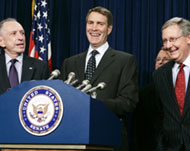Senate dares Bush to veto bill
The US Senate has approved funding for wars in Iraq and Afghanistan and hurricane-recovery efforts, ignoring the president’s threat to veto the $108.9 billion bill which he says is loaded with unnecessary spending.

By a vote of 78-20, the Senate on Thursday approved an emergency bill that would spend $14.4 billion more than George Bush requested.
Bill Frist, the Senate Majority Leader and a Tennessee Republican, backed the president by voting against the measure.
The House of Representatives, on the other hand, passed a bill in line with Bush’s request. The two chambers will now try to work out their differences by the end of this month.
Before completing the bill, the Senate cut $47 million in foreign aid this year to Egypt, one of the largest recipients. Of that, $35 million would be reassigned for famine and disaster relief in Uganda, Kenya, Ethiopia and possibly Somalia.
The Bush administration backed the change, according to an aide to Senator Patrick Leahy, the Vermont Democrat who pushed the amendment.
The remaining $12 million would help Guatemala rebuild in the aftermath of last year’s Hurricane Stan.
Iraq and Afghanistan
Overall, the Senate bill contains about $3.5 billion more in foreign aid for several countries, including Iraq, Afghanistan and Jordan.
The emergency bill would provide a new injection of nearly $66 billion that the Pentagon says it needs by early summer to help replenish combat equipment and recruit soldiers for the wars in Iraq and Afghanistan.
Another $28.9 billion would be used for rebuilding Louisiana, Mississippi and other southern states after last summer’s devastating Hurricane Katrina and other storms.
 |
|
Frist (C) the Senate Majority |
Bush has objected to some of the storm-relief projects the Senate has included, as well as about $4 billion in farm aid.
“The president has made it very clear he would veto legislation that goes above and beyond what he called for,” Scott McClellan, White House spokesman, said after the Senate vote.
He predicted a veto, which would be Bush’s first ever, would be upheld and cited a letter from 35 senators backing Bush’s demand to put a limit on the bill’s cost.
John Boehner, the House Majority Leader and an Ohio Republican, took a hard line against the Senate spending bill.
“The House will not take up an emergency supplemental spending bill for (Hurricane) Katrina and the war in Iraq that spends one dollar more than what the president asked for. Period,” Boehner said.
Showdown
Some senators appeared to relish a showdown.
Senator Robert Byrd of West Virginia, the senior Democrat on the Senate Appropriations Committee, complained that Bush’s request did not provide aid for a range of domestic disasters, including fatal coal-mine accidents and farmers’ crop losses.
The Senate bill couples such funds to the war-funding bill.
|
“If the president wants to veto a bill that funds the troops, if he wants to veto a bill that funds victims of Hurricane Katrina… have at it, have at it” Robert Byrd, |
“If the president wants to veto a bill that funds the troops, if he wants to veto a bill that funds victims of Hurricane Katrina … have at it, have at it,” Byrd taunted.
But even if the final bill falls within Bush’s $94.5 billion target, all of the money would contribute to an anticipated budget deficit of around $350 billion this year.
Senator Tom Coburn, an Oklahoma Republican, who tried to trim the spending bill, complained on Wednesday that there was no attempt to cut elsewhere in the budget to make up for the new spending.
Senator Patty Murray, a Washington Democrat, said the bill’s size resulted from a series of Bush budgets that have been “unrealistically small”, in part because they excluded war costs that the administration knew would have to be funded.